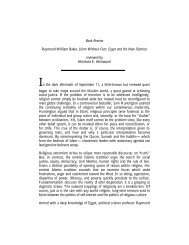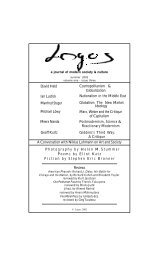Michael J. Thompson Stephen Eric Bronner Wadood Hamad - Logos
Michael J. Thompson Stephen Eric Bronner Wadood Hamad - Logos
Michael J. Thompson Stephen Eric Bronner Wadood Hamad - Logos
You also want an ePaper? Increase the reach of your titles
YUMPU automatically turns print PDFs into web optimized ePapers that Google loves.
Robert J. Antonio<br />
much from his sociology as from his normative ideas. His analysis of<br />
capitalism poses still compelling questions about its highly problematic<br />
relationship with democracy. His view that socio-economic matters condition<br />
fundamentally the shape, quality, and possibility of democracy and, thus, need<br />
to be taken account of in theory and practice does not by itself constitute a<br />
sociological reduction of politics. By contrast, unqualified emphasis on the<br />
autonomy of politics does not favor inquiry into the impacts of wealth and<br />
power on democracy, which are often concealed or intentionally suppressed.<br />
Addressing the impacts of expanded corporate power and increased economic<br />
inequality, under neoliberal globalization, is essential to today’s debates over<br />
the prospects for democracy and does not preclude the relative autonomy of<br />
politics or deny other forms exclusion. A theory of radical democracy must<br />
bring to the foreground the unequal and unjust distribution of the material<br />
and cultural means of participation. Marx’s impassioned emphasis on this<br />
matter gives him more than nine lives and is the reason that his specter still<br />
hangs over us today. In this light, Howard’s emphasis on the importance of<br />
Marx’s normative side makes sense. But Marx’s vision of capitalist inequality is<br />
the main point of conjuncture between his philosophy and sociology—his<br />
sociology provides his normative vision of justice specificity and historicity.<br />
That Howard is silent about the relation of capitalism and democracy raises<br />
questions about the methodological adequacy as well as the historicity of his<br />
claims about the autonomy of politics and his dim view of the sociological<br />
moment of criticism.<br />
Arguably Marx founded the tradition of modern “social theory.” Social<br />
theorists frame normative arguments, but their work is distinguished from<br />
earlier types of normative theory by a strong sociological moment. Although<br />
the borders are fluid, social theory’s normative thrust distinguishes it from<br />
more narrowly-focused, empirically-oriented “sociological theory” and social<br />
science. By contrast to religion and metaphysics the legitimacy of social theory<br />
depends on the discursively-mediated, empirical-historical validity of its<br />
“sociological” claims as well as the consistency, persuasiveness, and<br />
emotional/aesthetic force of its normative facets. Social theory’s project of<br />
providing an “historical” alternative to absolutist normative argument is neither<br />
complete nor transparent. First-generation social theorists, like Marx, often<br />
conflated History with history and tried to justify their practice as “science,”<br />
obscuring its normative thrust. Howard rightly criticizes this reduction, which<br />
<strong>Logos</strong> 2.3 – Summer 2003




